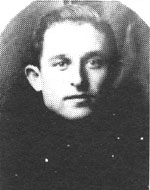Chaimovitz, Yechiel
Son of Bracha and Yehuda. He was born on December 31, 1911, in the city of Mekhudiya, Romania, where he settled in Kfar Saba and immigrated to Palestine in 1918. In the riots of 1921, the family was forced to move to Petah Tikva where she lived for two years. Yechiel attended Talmud Torah. At the age of 12, he began working to help support the family: carpentry, pickling citrus in the winter and in various agricultural work in the summer. He had physical strength and devoted himself to sports, especially soccer. For some time he played for the soccer team “Hakoach Kfar Saba”. After he married a wife and established a family he moved to work as a taxi driver in Tel Aviv, Haifa and other places in Israel. Afterward, he returned to his settlement and lived there with his family, earning a living from working in orchards. From his youth he was a member of the Betar youth movement, and during the 1929 riots he was active in defending the settlement and often infiltrated an Arab village nearby to see what was happening on the ground. In 1933, after the murder of Arlosoroff, he was arrested as a “collaborator in committing the crime” as a taxi driver who allegedly led Stavsky and Rosenblatt, who were suspected of murdering the Tel Aviv shoreline, but was released a few days later. When the riots broke out in 1936, he volunteered to guard the orchards in the vicinity of Kfar Sava and then Nautar, in a citrus grove in the vicinity of Ramat Hakovesh, between Misky and Tira, two villages that threatened the security of the surrounding Jewish communities. On July 29, 1936, he went with two other guards to inspect orange groves and on the way a deadly fire from ambush opened up against them. Yehiel was seriously wounded in the thigh. But his spirit was good for him because the assailants were on the way and for first aid even joked with his friends. He was taken to Hadassah Hospital in Tel Aviv and died that night on the operating table. The next day he was laid to rest in the Kfar Sava cemetery. He left a wife and two daughters. On the seventh day of his fall he was set up in the flower garden in the orchard next to which a memorial monument was engraved: “Demi Yehiel Haimovitch, who gave his life on the protection of Jewish property and the honor of the Yishuv.”
